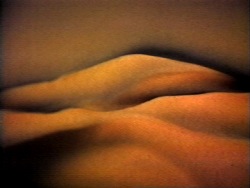In Landscape, a single illuminated hand positioned before the camera is transformed through its scale and deliberate movements into a sculptural landscape.
Using a macro lens and slow motion to examine the detailed surface image of her face, Hoover allows a dramatic typography of texture and light to emerge in Halfsleep. She states that this work suggests "timeless moments when we are between two worlds, when our perceptions are heightened, sounds take on other dimensions and we become almost microscopic within ourselves."
The magnified, close-up image of a staring eye, juxtaposed with amplified ambient sounds, is the focus of Eye Watching. By isolating the act of seeing, Hoover creates a metaphorical study of voyeurism and observation, as the eye responds to passing shadows and the external sounds.
In Returning to Fuji, Hoover creates the perception of a mountain swathed in mist through gradual changes of shifting light and shadow, accompanied by evocative sound.
Using deep red and ochre hues, Hoover suggests an ambiguous landscape in Desert, orchestrating shifting light to evoke the cycle of a day on the sands of a desert.
Description
In this collection of works, Hoover subtly orchestrates light and movement in real time to suggest enigmatic sculptural landscapes. At times using her own body as landscape, she creates an evocative tension between abstraction, reality and illusion.
In Landscape, a single illuminated hand positioned before the camera is transformed through its scale and deliberate movements into a sculptural landscape. Using a macro lens and slow motion to examine the detailed surface image of her face, Hoover allows a dramatic typography of texture and light to emerge in Halfsleep. She states that this work suggests "timeless moments when we are between two worlds, when our perceptions are heightened, sounds take on other dimensions and we become almost microscopic within ourselves." In Returning to Fuji, she creates the perception of a mountain swathed in mist through gradual changes of shifting light and shadow, accompanied by evocative sound. Using deep red and ochre hues, Hoover suggests an ambiguous landscape in Desert, orchestrating shifting light to evoke the cycle of a day on the sands of a desert. The magnified, close-up image of a staring eye, juxtaposed with amplified ambient sounds, is the focus of Eye Watching. By isolating the act of seeing, Hoover creates a metaphorical study of voyeurism and observation, as the eye responds to passing shadows and the external sounds.




